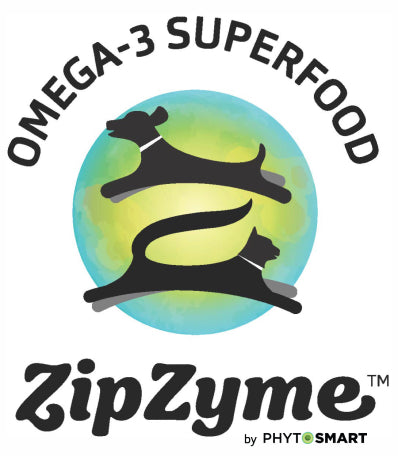White Papers and Scientific References
PhytoSmart™ Pioneers UNEXTRACTED Whole Food Essential Fatty Acid Nutrition with ZipZyme™ Omega.

White Papers
Read our White Papers to learn why ZipZyme™ Omega should be a part of your pet’s healthy diet.
Scientific References
Oxidation:
• The negative health consequences of omega-3 oxidized extracted fish or algal oil are validated in the article that appeared in the UK newspaper on January 17, 2022.
Reference: https://www.theguardian.com/environment/2022/jan/17/revealed-many-common-omega-3-fish-oil-supplements-are-rancid
• Omega-3 oils shown to be already oxidized above standard (0.5meq) while still on the shelf, and that they do not meet their stated omega-3 content.
References: - Albert, B. B., Derraik, J. G., Cameron-Smith, D., Hofman, P. L., Tumanov, S., Villas-Boas, S. G., ... & Cutfield, W. S. (2015). Fish oil supplements in New Zealand are highly oxidised and do not meet label content of n-3 PUFA. Scientific reports, 5(1), 7928.
- Heller, M., Gemming, L., Tung, C., & Grant, R. (2019). Oxidation of fish oil supplements in Australia. International journal of food sciences and nutrition, 70(5), 540-550.
• Maternal supplementation of oxidized fish oil shown to increase newborn mortality in mice.
(Reference: Albert, B. B., Vickers, M. H., Gray, C., Reynolds, C. M., Segovia, S. A., Derraik, J. G., ... & Cutfield, W. S. (2016). Oxidized fish oil in rat pregnancy causes high newborn mortality and increases maternal insulin resistance. American Journal of Physiology-Regulatory, Integrative and Comparative Physiology, 311(3), R497-R504.)
• Omega-3 oxidation is linked to pathophysiological changes in inflammation-associated diseases such as neurodegenerative diseases (including Alzheimers) and carcinogenesis (cancers). Omega-3 oxidation is linked to increases in malondialdehyde levels, which can result in DHA mutations and subsequent thyroid tumors, skin, and breast cancers.
(Reference: Lange, K. W., Nakamura, Y., Gosslau, A. M., & Li, S. (2019). Are there serious adverse effects of omega-3 polyunsaturated fatty acid supplements?. Journal of Food Bioactives, 7.)
• Oxidized omega-3 in extracted oils interferes negatively with the oils’ intended benefits.
(Reference: Mason, R. P., & Sherratt, S. C. (2017). Omega-3 fatty acid fish oil dietary supplements contain saturated fats and oxidized lipids that may interfere with their intended biological benefits. Biochemical and biophysical research communications, 483(1), 425-429.)

Phospholipid DHA:
• Phospholipid omega-3s, such as DHA, are more bioavailable than other forms, including ethyl ester and triglyceride. The better bioavailability of phospholipid DHA means they have a superior absorption rate within the body, making them more effective nutrition.
(Reference: Ulven, S. M., & Holven, K. B. (2015). Comparison of bioavailability of krill oil versus fish oil and health effect. Vascular health and risk management, 511-524.)
• Phospholipid DHA impacting Alzheimer's disease symptoms. The phospholipid forms of DHA have been shown to help alleviate symptoms of Alzheimer's disease. Phospholipid DHA is more effective at reducing Alzheimer’s risk than other DHA forms.
(Reference: Ferreira, I., Rauter, A. P., & Bandarra, N. M. (2022). Marine Sources of DHA-Rich Phospholipids with Anti-Alzheimer Effect. Marine Drugs, 20(11), 662.)
• Phospholipid DHA has been shown to improve cognitive function and memory more effectively than ethyl ester and triglyceride DHA.
(Reference: Wang, C. C., Guo, Y., Zhou, M. M., Xue, C. H., Chang, Y. G., Zhang, T. T., & Wang, Y. M. (2019). Comparative studies of DHA-enriched phosphatidylcholine and recombination of DHA-ethyl ester with egg phosphatidylcholine on ameliorating memory and cognitive deficiency in SAMP8 mice. Food & function, 10(2), 938-950.)
• Phospholipid DHA has been shown to enter the brain more effectively than triglyceride DHA when using tracer molecules.
(Reference: Kitson, A. P., Metherel, A. H., Chen, C. T., Domenichiello, A. F., Trépanier, M. O., Berger, A., & Bazinet, R. P. (2016). Effect of dietary docosahexaenoic acid (DHA) in phospholipids or triglycerides on brain DHA uptake and accretion. The Journal of Nutritional Biochemistry, 33, 91-102.)
• Phospholipid DHA shown to be more effective than Ethyl ester and triglyceride DHA on improving gut health in mice.
(Reference: Cao, W., Wang, C., Chin, Y., Chen, X., Gao, Y., Yuan, S., ... & Tang, Q. (2019). DHA-phospholipids (DHA-PL) and EPA-phospholipids (EPA-PL) prevent intestinal dysfunction induced by chronic stress. Food & function, 10(1), 277-288.)

Omega-3 Benefits:
• Omega-3 DHA supplementation is shown to improve brain health in fetuses and infants in mice.
• Omega-3 DHA supplementation is shown to reduce preterm deaths.
• Allergy and immunity benefits associated with breastmilk / formula high in omega-3 - correlated to reduced eczema and asthma.
• Cardiovascular disease - Omega-3 linked to reduction in atherosclerotic heart disease, sudden coronary death and peripheral arterial diseases.
• Omega-3 shown to reduce cardio-metabilic risk factors (dyslipidemia, high blood pressure, arterial compliance, vascular reactivity and inflammation).
• Reduction in coronary heart disease events and myocardial infarction when supplementing with DHA.
• Omega-3s linked to improvements in intermediate and late stage macular degeneration.
• Omega-3 newly recognised as a prebiotic - positively affecting colonies of Bifidobacterium, Roseburia and Lactobacillus, leading to increases in the gut of the beneficial molecule, butyrate.
(Reference: Li, J., Pora, B. L., Dong, K., & Hasjim, J. (2021). Health benefits of docosahexaenoic acid and its bioavailability: A review. Food Science & Nutrition, 9(9), 5229-5243.)
Omega-3 Index:
This paper provides a great overview of the omega-3 index and how it pertains to cats and dogs. This summary shows that while dogs and cats have a lower omega-3 index range than humans, omega-3s are still a critical part of their nutrition. Linda Case’s publishing references the following scientific papers:
- Harris, WS, Jackson KH, Carlson H, et al. (2023). Derivation of the Omega-3 Index from EPA and analysis of dried blood spots from dogs and cats. Veterinary Sciences; Vol 10
- Lindquist H, Dominguez T, Dragoy R. (2023). Comparison of fish, krill and flaxseed as omega-3 sources to increase the omega-3 index in dogs. Veterinary Sciences. Vol 10, 162.doi.org/10.3390/vetsci10020162.
OmegaQuant has direct ties to Dr. William Harris, one of the initial omega-3 researchers who has now published over 300 pieces of scientific literature on omega-3s. OmegaQuant provides omega-3 testing kits, so that you can be better informed about you and your pets omega-3 needs.


